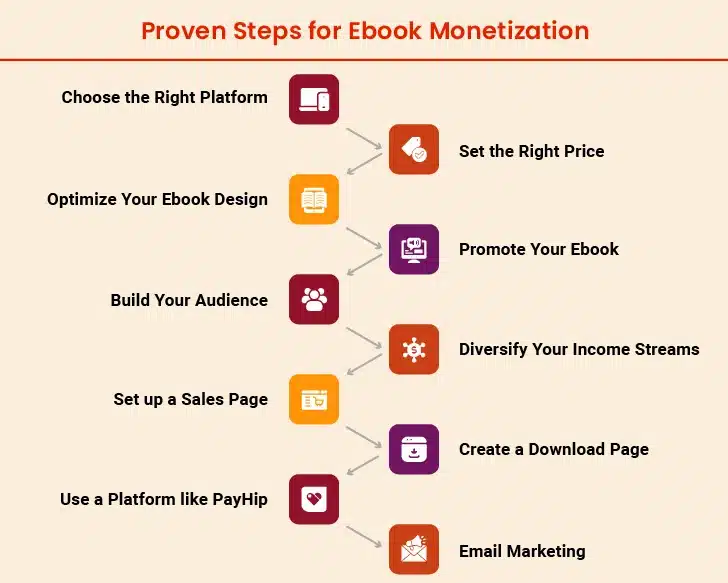The advent of online books has transformed the way content is published and consumed. These have certainly added value to the lives of readers who want easy access to their relevant content, making them a preferred choice. The easy accessibility and portability of ebooks make them a popular and viable alternative to traditional ones. This could be the reason why the global ebooks market size is expected to reach 29.9 billion USD by 2033 with a CAGR of 5.1% (2024-2033).

This rise of digital reading, fueled by the rise of ereaders and mobile devices, has undeniably transformed the publishing landscape, and ebook conversion services As technology continues to evolve, the future of digital reading and ebook publishing is brimming with exciting possibilities, some of which are listed below:
Table of Contents
- Expanded Reach and Greater Revenue
- Enhanced Accessibility
- New Publishing Models
- Cost-Effectiveness and Efficiency
⇒ Challenges and Considerations
- Quality Control
- Evolving Formats and Technology
- Copyright and Piracy Concerns
- Pricing and Competition
⇒ Benefits of Digital Publishing Solutions
⇒ Understanding the Role of AI and Automation in Ebook Conversion
⇒ Proven Steps for Ebook Monetization
⇒ Looking Ahead
Impact on Publishers
1. Expanded Reach and Greater Revenue
Publishers that take the initiative to convert books to digital versions can unlock global markets and tap into previously inaccessible reader bases. Thus, there’s a greater potential audience for any given ebook. This not only opens up new revenue generation streams but also creates room for niche and diverse voices to be heard.
2. Enhanced Accessibility
Experts in the domain, like ebook conversion companies, can incorporate features like screen reader compatibility, text-to-speech, and adjustable fonts to make digital copies more accessible to readers with disabilities. They also take care of factors like color-contrast ratio, alt-text for images, and ensure a logical reading order by adding appropriate heading tags. Thus, the dual benefit of inclusivity and broadened reach of literature is achieved.
3. New Publishing Models
As a contemporary business model, ebook conversion paves the way for innovation and experimentation like subscription services and interactive storytelling. Publishers can experiment with dynamic content via the addition of engaging and interactive elements and deliver delightful reading experiences, catering to evolving reader preferences.
4. Cost-effectiveness and Efficiency
Equipped with advanced tools and a pool of specialists, outsourcing companies have streamlined the entire ebook publishing processes in place. These professionals can create ebooks that are attractive in nature and content enriched. Thus, publishers can save time and resources compared to traditional print production. Additionally, they can better concentrate on content creation and marketing, optimizing their workflow.
Impact on Authors
I. Self-publishing Empowerment
Professional ebook formatting services make self-publishing more accessible and affordable, particularly for independent writers who might lack the technical expertise to format their work for digital platforms. Outsourcing companies offer various options, including reflowable text and fixed layout ebook conversion, catering to different needs. This not only democratizes the publishing process but also allows authors to choose the level of service that best meets their goal.
II. Creative Freedom and Experimentation
The interactive and dynamic nature of digital books distinguishes them from the traditional ones. Unlike paperback books, digital formats allow authors to add multimedia elements including audio, video, and interactive features such as quizzes, hyperlinks, questionnaires, etc. Blurring the lines between traditional storytelling and immersive narratives, writers can deliver an enriched reading experience.
Self-Publishing vs Traditional Publishing: How Ebook Conversion Services Make a Difference
III. Multilingual Assistance
Transcending geographical limitations, ebooks can reach readers in remote areas or those with limited access to physical bookstores. Having multilingual experts, ebook consulting services can help authors reach readers worldwide by translating their books into multiple languages, all without missing the essence of the content. This fosters cross-cultural exchange and promotes diverse voices on a global stage.
Challenges and Considerations
1. Quality Control
Quality control remains crucial, as poorly formatted ebooks can hinder the reading experience. That said, maintaining the integrity and the essence of the original text while ensuring an immersive digital experience during the ebook conversion process are crucial considerations. The smarter option to strike a perfect balance between the two is to partner with a services provider that prioritizes accuracy and adherence to industry standards.
2. Evolving Formats and Technology
The digital reading landscape is constantly evolving, with new formats and technologies emerging. While it is practically not possible for writers and publishers to stay up to date at all times with these advancements, collaborating with conversion service providers that are equipped with the latest publishing tools and technology such as augmented reality (AR) and virtual reality (VR) can help. They can ensure compatibility with multiple platforms and future-proof their offerings.
3. Copyright and Piracy Concerns
The digital format also brings challenges related to copyright protection and piracy. Publishers and ebook conversion service providers need to implement robust measures to protect intellectual property and ensure fair compensation for content creators. Another important thing to note is that ethical considerations regarding the conversion of older or out-of-print works require careful attention to copyright and authorial intent.
4. Pricing and Competition
The ebook publishing market is competitive, with varying pricing structures and service levels. Though it is a great opportunity for authors and publishers to grab a good deal out of so many options, businesses that are outsourcing ebook conversion for the first time should carefully assess their needs and budget to choose the right service provider. Conducting a cost-benefit analysis while outsourcing ebook publishing services benefit from the digital market.
Benefits of Digital Publishing Solutions
Here are some key benefits of digital publishing solutions over traditional printing.
I. Better Revenue
Digital publishing offers new ways for authors and publishers to earn money besides ebook sales. They can include ads in their ebooks or offer special content for a fee. Many digital platforms also allow subscription models where readers pay monthly for access to multiple titles or services. These extra income options provide financial flexibility and growth opportunities.
II. Easy Updates and Edits
With digital publishing, making changes after publication is easy. If an author finds a mistake in their ebook, they can quickly fix the error and republish it effortlessly. Conversely, fixing errors in traditional publishing often means reprinting the whole book. This is not only expensive but also time-consuming. Digital formats allow quick updates, so readers always have the latest information.
III. Eco Friendly
Digital publishing is better for the environment than traditional printing. It doesn’t require paper or ink for publishing books. Every year, millions of trees are cut down to produce paper for books. This leads to environmental issues. By choosing digital formats, authors and publishers help diminish waste and save resources. This eco-friendly choice attracts many readers who support green initiatives.
Perfect Formatting, Seamless Reading – Let’s Make Your eBook Shine!
IV. No Storage Issues
With digital books stored online, there’s no need for physical storage space. Authors don’t have to worry about where to keep unsold copies or how much space they need for inventory. Readers also enjoy this convenience since they can carry thousands of ebooks on their devices without taking up space at home or work.
V. Faster Time to Market
Digital publishing allows authors and publishers to share their work quickly. Conversely, traditional publishing takes months or years for a hard copy to be ready to sell. With digital publishing, once the content is ready, it can be published right away. Authors may upload their content online and sell them within a few hours or days. This is great for authors who want to share important information quickly. Faster publishing means readers can get new content sooner, keeping them engaged.
VI. Wider Reach
Digital publishing lets authors connect readers globally. Ebooks can be accessed online by readers from anywhere. This means authors can connect with readers worldwide without worrying about shipping. A wider reach increases sales chance and helps authors grow their audience. Digital platforms also send notifications about new releases, keeping readers updated.
Ebook Conversion 101: What, Why, and How
Understanding the Role of AI and Automation in Ebook Conversion
Listed below are the ways AI and Automation help in transforming digital publishing solutions.
1. Enhanced Editing and Proofreading
AI makes editing and proofreading ebooks better. AI helps find grammar and spelling errors that a human might miss. This helps authors create cleaner content without the need to hire editors. AI may also suggest ways to improve writing tone or style. This makes it easier for authors to refine their work.
2. Better Search Functionality
AI improves search functionality within ebook platforms by understanding user questions more clearly. Instead of just matching words, AI can figure out what people really want and give better results. For example, if a reader searches for “fiction”, the platform may suggest books that fit that theme instead of finding those words in titles.
3. Cost-Effective Production
Using automation in ebook production can lower costs a lot. It diminishes the need for manual tasks like formatting and editing. This saves time and money for both authors and publishers. As a result, ebooks are produced at a lower cost. This makes ebooks accessible to more users.
4. Content Creation
AI can help authors create content for ebooks using NLP technology. Authors may use AI to come up with unique ideas. For example, an author might enter a topic into an AI tool, which further suggests key points to include in the book. This helps simplify the writing process and inspire new ideas. Furthermore, authors may add puzzles or elements like videos and audio clips in their ebooks. These features make reading more fun and engaging to a wider audience.
5. Dynamic Pricing Models
AI can look at market trends to change ebook prices in real time. For instance, if a book is gaining attention, the price might increase to maximize profits. Conversely, if sales are plunging, the price could go down to attract more buyers. This helps publishers earn more while keeping prices fair for readers.
6. Data Analytics for Publishers
AI gives useful data into how readers behave through data analysis. Publishers may track how readers engage with their ebooks. This may include which sections are most popular or where readers drop off. This data helps publishers make smart decisions about future titles and marketing plans.
7. Efficient Distribution
AI improves how ebooks are distributed across different platforms. By looking at data on where readers are located and how they prefer to read books, AI helps publishers choose the right distribution channel. This helps ensure that ebooks reach the right audience at the right time.
Proven Steps for Ebook Monetization
Listed below are the steps that need to be followed for ebook monetization.

I. Choose the Right Platform
The first step is to pick the best place to sell your ebook. There are many options out there. Each one has different fees, royalty rates, and audience types. Research each platform to see which one fits your ebook’s genre and style.
II. Set the Right Price
Pricing your ebook isn’t easy. Think about your costs and what your ebook offers. Also, consider how much your competition is charging. Test different prices and see what works best based on what your readers say and how much demand there is. You want to price it competitively, but not too cheap or too expensive.
III. Optimize Your Ebook Design
Your ebook should look professional and appealing. This includes your cover, layout, fonts, images, and formatting. Make sure it matches your brand and message. It also needs to work on different devices and follow ebook design standards.
IV. Promote Your Ebook
Promotion is key to getting people interested in your ebook. Use social media to spread the word. Connect with people in person and online. Talk about the person behind the book, not just the book itself.
V. Build Your Audience
Connect with your potential and current readers. Give them something useful, talk to them, and stay in touch often. Use newsletters, webinars, and freebies to get people to join your email list. Building an audience helps build trust and encourages people to buy your ebook.
VI. Diversify Your Income Streams
Don’t just rely on ebook sales. You can offer chapters over time for a subscription fee, bundle eBooks, or give some away for free to attract customers.
VII. Set up a Sales Page
Create a page on your website where people can buy your ebook. Include a “Buy now” button that links to your payment system.
VIII. Create a Download Page
Make a page where customers can download their ebook after they pay. This page should only be accessible to those who have paid.
IX. Use a Platform like PayHip
Platforms like PayHip handle things like sales tax (VAT) for you. Just connect it to your PayPal or Stripe account and upload your ebook.
X. Email Marketing
Create an email series to get people excited before you launch your ebook. Offer valuable content in each email while building anticipation for the full ebook.
Looking Ahead
The evolution of ebook publishing and digital reading is nothing short of a remarkable one. From paper to pixels, ebooks have reshaped the way we read and learn content. This segment is poised to become even more immersive, personalized, and inclusive with ebook conversion services playing a pivotal role in shaping the future of digital reading. And, as technology advances and reader preferences continue to shift, the impact of ebooks will only become more profound. By facilitating global reach, enhancing accessibility, and enabling innovative storytelling, they empower publishers and authors to thrive in the evolving literary landscape.





